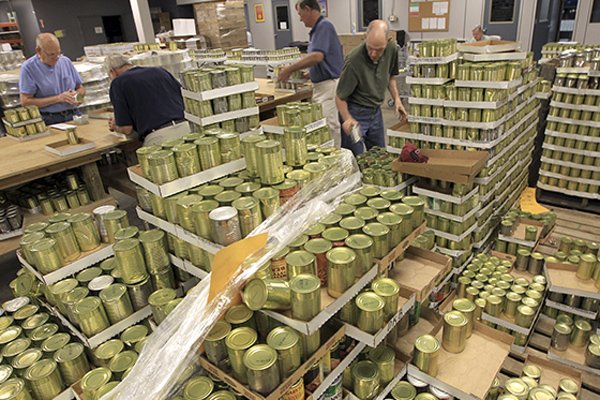LITTLE ROCK — This week the Arkansas Rice Depot found itself in a bind: With the exception of some ground-sausage pizza topping, its meat freezers were empty.
“We are very grateful to the pizza people in the world, but that is our only source of meat,” said Laura Rhea, president and chief executive officer of the Arkansas Rice Depot.
This year has marked the first time that Rhea, who has worked at the depot 26 years, has experienced a meat shortage, and food pantries across the state are dealing with a similar problem.
“Normally we get a lot of chicken, a lot of meals - frozen TV dinner meals - but right now we are just totally out,” Rhea said. “When we’re out of meat, that means the 312 food pantries we serve across the state are out of meat.”
The Arkansas Rice Depot provides church and community food pantries across the state monthly supplies of food. Rhea said about 418,000 Arkansans, or roughly 15 percent of Arkansas’ 2.8 million people, received meals from the Rice Depot’s distributors at some point last year.
Rhea said the depot usually distributes about 30,000 pounds of meat out of the approximately 700,000pounds of food it distributes monthly.
While the Rice Depot is experiencing a meat shortage, Rhea said, it is still well stocked with rice, grains, fruits and vegetables.
The Rice Depot isn’t alone. The Union Rescue Mission in Little Rock is also seeking meat donations.
“We haven’t gotten meat donated in about a month,” said Justin Mendez, a director in the mission’s men’s ministries. He said the mission provides about 162 meals a day.
“I just don’t think people are willing to freely give it without need, as they may be in the winter months,” he said. “I think it’s really all about putting your need out there and letting them know they [can] help with meat.”
Richard Lobb, spokesman for the National Chicken Council, said he wasn’t surprised to hear of food pantries lacking meat.
“We have been expecting some tightness in supply,” he said. The council represents chicken-processing companies around the nation, several of which donate products to food banks.
He said the cost of feeding cattle has increased because the price of corn has risen by about 60 percent, largely because of the government’s policy of using corn to produce ethanol for fuel. Lobb said the same trend can be seen with poultry.
“We purchase about 13 percent of the entire corn crop to feed chickens, and we really don’t have any other place to turn - we don’t have sorghums or wheats to replace corn with,” he said.
While some food banks are reporting difficulties procuring meat, the problem isn’t hitting all food banks the same way.
For example, the Northwest Arkansas Food Bank is reporting only a slight decline in the availability of meat products, said Gerald Demory, director of operations.
“We’ve been pretty fortunate since we have Tyson right here in our backyard,” Demory said. “But proteins are always hard to come by.”
Rhonda Sanders, executive director of the Arkansas Hunger Relief Alliance, said she hasn’t heard of any serious shortages from any of the food banks that Alliance works with.
The Alliance serves six Feeding America food banks and an independent food bank in Hot Springs.
“We have had access to protein items,” Sanders said. “Is it enough? No. I mean, we could always use more. But it’s not a situation we’d put out as an emergency type of situation either.”
She noted the nutritional role of protein.
“It’s extremely important; it’s something all our food banks and all the folks who work in other food banks should try to get - beans, peanut butter, meat products,” Sanders said. “It’s a foundation of someone’s diet, as well as fresh fruits and vegetables. Both of those are just essential for people to be healthy.”
Rhea said she thinks the recession is playing a large part in the Rice Depot’s shortage.
“I have a feeling what this means in large part is that food processors are doing a better job watching their bottom line, which is good for them, but we could use a big mistake,” she said. “We could use a tractor-trailer load of meat that’s been labeled with the wrong ounces or something.”
Rhea said chicken producer Pilgrim’s Pride, which went bankrupt in 2008, had been a big provider and that the depot has felt its absence. She also attributed the shortage to natural disasters that have diverted food processors’ attention to other parts of the country.
“Probably some meat that would have come to a place like the Arkansas Rice Depot in a normal year has gone to tornado victims in Oklahoma and Mississippi and flooding victims in Tennessee, and rightly so,” Rhea said.
Tyson Foods Inc. has been a food donor to the Arkansas Rice Depot. Ed Nicholson, Tyson’s director of community relations, said he is often told that food banks have a difficult time providing protein.
He also said the recession isn’t helping matters. “There’s a much more intense focus on managing inventories,” Nicholson said.
In the past three or four years, he said, Tyson has donated 8 million to 11 million pounds of food per year across the country, and the company will probably donate the same amount this year.
“We will very likely donate a truck of food to Little Rock at some point this summer,” he said.
Front Section, Pages 1 on 06/04/2010
